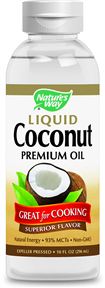Someone made mention of this new high-MCT coconut oil today in one of the forums or another, and it seemed topical to an N=1 experiment that my friends April and John over at LivingKeto.info are doing in regards to supplementing with MCT oil. (They haven’t written about it yet, so I hope I’m not giving anything away by making reference to it.) At any rate, they are using one of the standard MCT Oils available. I’ve heard negative feedback regarding the taste with the standard oils, so this new Nature’s Way product might be an appealing alternative to those pursuing MCT oil supplementation.
If you aren’t familiar with MCT oil and why people use it, Phinney and Volek offer the following explanation of what it does in The Art and Science of Low Carbohydrate Performance:
Unlike most of the fats we eat (i.e., the long-chain triglycerides [LCT] having between 14 and 18 carbons per fatty acid), medium-chain triglycerides (MCT) are made from smaller fatty acids that range between 6-12 carbons in length. In respect to their metabolism, MCT have three very important distinctions from LCT. First, they are absorbed much more quickly. Second, MCT don’t get stored in fat cells, so once consumed, they need to be processed immediately. Third, MCT are not dependent on the same regulatory factors that control LCT entry into cells and mitochondria; so MCT are promptly oxidized in muscle cells or used by the liver to make ketones. Thus, depending on the dose, ingestion of MCTs can result in rapid elevation of ketones.
Because of this, many low carb athletes take MCT oil as a quick energy source instead of glucose. In the low carb community, MCT oil is well noted for consistently turning ketostix purple, and it’s a popular belief (though I’ve not seen it studied) that MCT oils will speed the rate at which one enters ketosis (when starting a low carb diet) or that MCT oil supplementation will help promote weight loss on a ketogenic diet.
I’m curious to learn more about these points, as Phinney and Volek clearly do not endorse supplementing MCT oil. However, they also say not to avoid foods (like coconut oil, and to a far lesser degree, butter and cream) that contain it naturally. I would have expected that if it promoted weight loss, that they would have written more about this (potential) benefit. Regardless, since the new Nature’s Way product is sourced from non-GMO coconuts, it may make the blur the lines for some people between MCT oil supplementation (not recommended by Phinney and Volek) and eating “foods” that are naturally high in it (A-OK, according to Phinney and Volek).
Personally, I find that Alice and Fred Ottoboni provide a much more helpful explanation of how these unique fatty acids confer some of their health benefits:
There are also considerable data that one or more saturated fatty acids provide health benefits over and beyond their basic nutrient properties. Such nutrients are classed as functional foods (26). Lauric acid [the primary MCT found in coconut oil], a 12-carbon-chain saturated fatty acid, and its monoglyceride monolaurin are examples. They have long been known to possess antiviral, antibacterial, antiprotozoal, and antifungal properties. In recent years, other medium chain saturated fatty acids such as 10-carbon capric acid have been found to possess similar activity. In addition to antibiotic activity, oils whose major saturated fat is lauric acid (lauric oils) have been shown to promote conversion of omega-3 alpha-linolenic acid to EPA and DHA and improve the immune system’s anti-inflammatory response (26).
That last part is important to me, since inflammation is related to so many chronic diseases and conditions and something most nutrition and health researchers appear to be imploring people to actively reduce.
Resources
- Nature’s Way Premium Liquid Coconut Oil on Amazon
- Nature’s Way Premium Liquid Coconut Oil on Nature’s Way Website
- LivingKeto.info
- The Art and Science of Low Carbohydrate Performance, Stephen Phinney and Jeff Volek
- Modern Nutritional Diseases, Alice and Fred Ottoboni


Coconut oil is an edible oil extracted from the kernel or meat of matured coconuts harvested from the coconut palm (Cocos nucifera). Throughout the tropical world, it has provided the primary source of fat in the diets of millions of people for generations. It has various applications in food, medicine, and industry. Because of its stability, it is slow to oxidize and, thus, resistant to rancidity, lasting up to two years owing to the high saturated fat content.”
Latest content coming from our blog page.